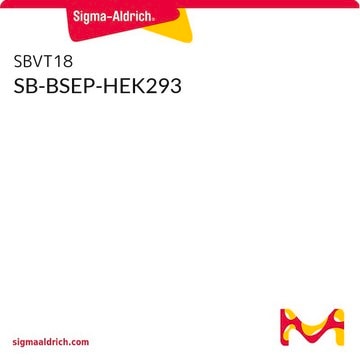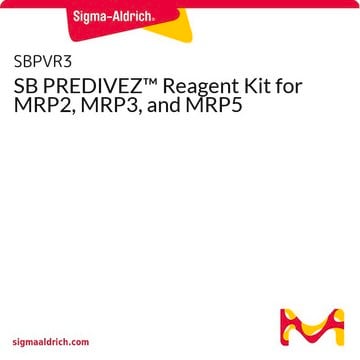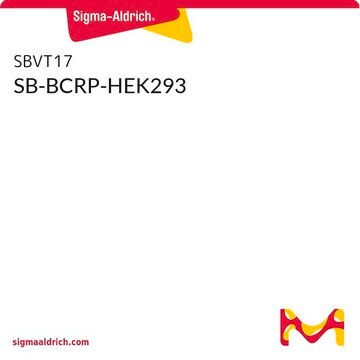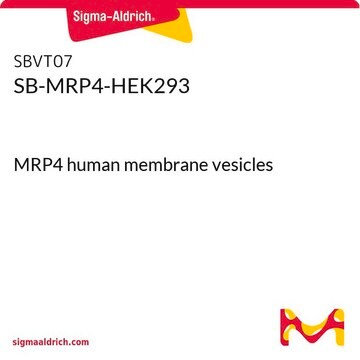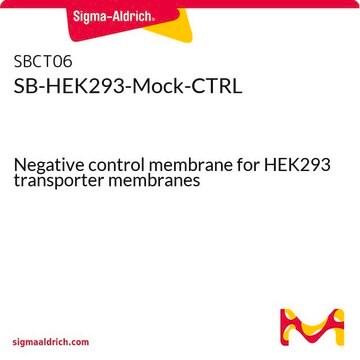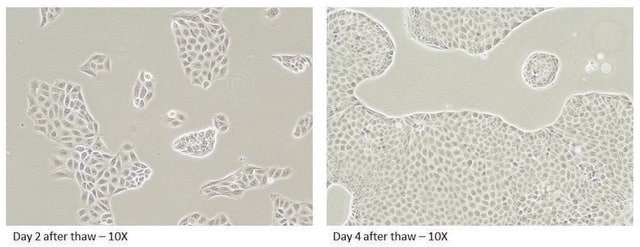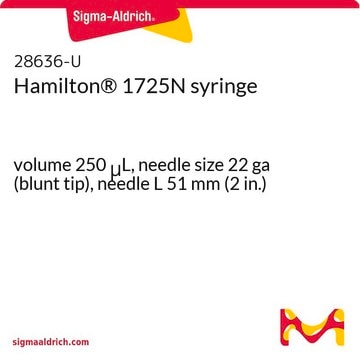SBVT14
SB-MRP2-HEK293
Sinónimos:
ABC30, CMOAT, MRP2, MRP2 human membrane vesicles, multidrug resistance protein 2
Iniciar sesiónpara Ver la Fijación de precios por contrato y de la organización
About This Item
UNSPSC Code:
12352202
Productos recomendados
form
liquid
concentration
5 mg/mL
shipped in
dry ice
storage temp.
−70°C
Gene Information
human ... ABCC2(1244)
General description
Membrane Preparations for Vesicular Transport Assays (VT) are suitable for general drug-efflux transporter interaction studies. Both substrate and inhibitor interactions can be assessed using vesicles. The success of substrate interaction studies strongly depends on the passive permeability of the compound. High permeability substrates might not be detected. Control Membranes with no-, or significantly lower transporter activity are also available.
Application
In the vesicular transport assay so-called "inside-out" membrane vesicles containing ABC transporters are applied. Incubating substrates of the respective efflux transporter in the presence of the inverted membrane vesicles and ATP will allow measuring accumulation of the substrates into the vesicles. In many cases radiolabeled reporter substrates are used but recently SOLVO developed the new PREDIVEZ Vesicular Transport Kits that use fluorescent reporter substrates.
The standard vesicular transport assay is an inhibitory assay performed with cold test articles. This assay provides information on any interaction between the ABC transporter and the test article. The transport of the reporter substrate is measured in the presence of the test article (typically in 7 concentrations) and IC50 is defined as the concentration inhibiting the transport of the reporter substrate by 50%.
Should radiolabeled form of the investigated compound or adequate analytical methods (LC/MS, HPLC) be available, the vesicular transport assay may be performed in a direct format without the reporter substrate and may identify substrate nature of the test article. The vesicular transport substrate assay is a low throughput assay. It is suitable for low permeability test compounds as high permeability compounds may escape from the vesicles through the lipid bilayer.
PREDIVEZ vesicular transport kit is sold separately. This transporter membrane vesicle assay requires the PREDIVEZ vesicular transport kit and corresponding control membrane below:
SB PREDIVEZ Reagent Kit for MRP2, MRP3, and MRP5 part number SBPVR3-9RXN and corresponding control membrane SB-HEK293-Mock-CTRL part number SBCT06-1EA
The standard vesicular transport assay is an inhibitory assay performed with cold test articles. This assay provides information on any interaction between the ABC transporter and the test article. The transport of the reporter substrate is measured in the presence of the test article (typically in 7 concentrations) and IC50 is defined as the concentration inhibiting the transport of the reporter substrate by 50%.
Should radiolabeled form of the investigated compound or adequate analytical methods (LC/MS, HPLC) be available, the vesicular transport assay may be performed in a direct format without the reporter substrate and may identify substrate nature of the test article. The vesicular transport substrate assay is a low throughput assay. It is suitable for low permeability test compounds as high permeability compounds may escape from the vesicles through the lipid bilayer.
PREDIVEZ vesicular transport kit is sold separately. This transporter membrane vesicle assay requires the PREDIVEZ vesicular transport kit and corresponding control membrane below:
SB PREDIVEZ Reagent Kit for MRP2, MRP3, and MRP5 part number SBPVR3-9RXN and corresponding control membrane SB-HEK293-Mock-CTRL part number SBCT06-1EA
Packaging
500 μL
Physical form
Supplied as frozen membrane vesicles, containing 5 mg/ml membrane protein, labeled with volume, catalog number (transporter) and date of production.
Legal Information
Distributed for SOLVO Biotechnology, Inc.
Related product
Referencia del producto
Descripción
Precios
Storage Class
10 - Combustible liquids
wgk_germany
WGK 2
flash_point_f
Not applicable
flash_point_c
Not applicable
Certificados de análisis (COA)
Busque Certificados de análisis (COA) introduciendo el número de lote del producto. Los números de lote se encuentran en la etiqueta del producto después de las palabras «Lot» o «Batch»
¿Ya tiene este producto?
Encuentre la documentación para los productos que ha comprado recientemente en la Biblioteca de documentos.
M G Donner et al.
Hepatology (Baltimore, Md.), 34(2), 351-359 (2001-08-02)
Cholestasis induces down-regulation of multidrug resistance protein 2 (Mrp2, symbol Abcc2), which is localized to the canalicular membrane. Given the overlapping substrate specificities of Mrp2 and multidrug resistance protein 3 (Mrp3, symbol Abcc3), we examined the hypothesis of a different
R Evers et al.
British journal of cancer, 83(3), 375-383 (2000-08-06)
The multidrug resistance proteins MRP1 and MRP2 are members of the same subfamily of ATP-binding cassette transporters. Besides organic molecules conjugated to negatively charged ligands, these proteins also transport cytotoxic drugs for which no negatively charged conjugates are known to
Thomas Rau et al.
Clinical pharmacology and therapeutics, 80(5), 468-476 (2006-11-23)
The adenosine triphosphate-binding cassette (ABC) class transporter ABCC2 (MRP2 [multidrug resistance related protein 2] or cMOAT [canalicular multispecific organic anion transporter]) is involved in the cellular outward transport and elimination of methotrexate. We hypothesized that common genetic variations may contribute
Anne T Nies et al.
Pflugers Archiv : European journal of physiology, 453(5), 643-659 (2006-07-19)
ABCC2 is a member of the multidrug resistance protein subfamily localized exclusively to the apical membrane domain of polarized cells, such as hepatocytes, renal proximal tubule epithelia, and intestinal epithelia. This localization supports the function of ABCC2 in the terminal
Isabelle Benz-de Bretagne et al.
Journal of biomedicine & biotechnology, 2011, 498757-498757 (2011-05-05)
MRP2 encoded by ABCC2 gene is involved in the secretion of numerous drugs and endogenous substrates. Patients with Dubin-Johnson syndrome due to mutation in ABCC2 gene have elevated urinary coproporphyrin ratio (UCP I/(I + III)). Here we investigated whether this
Nuestro equipo de científicos tiene experiencia en todas las áreas de investigación: Ciencias de la vida, Ciencia de los materiales, Síntesis química, Cromatografía, Analítica y muchas otras.
Póngase en contacto con el Servicio técnico
